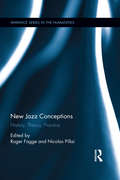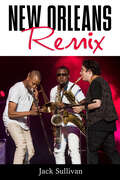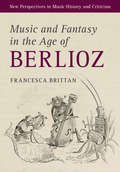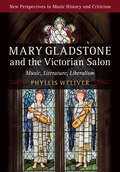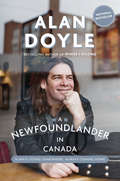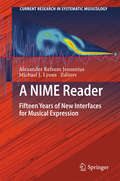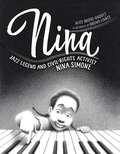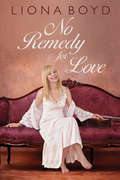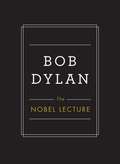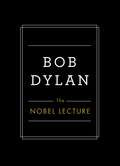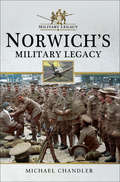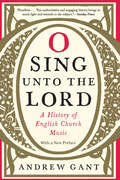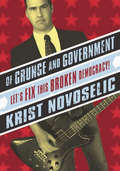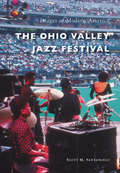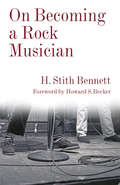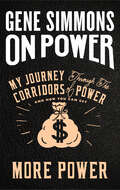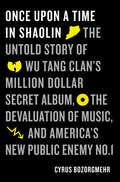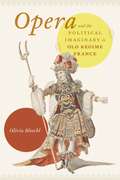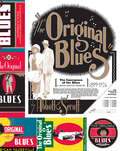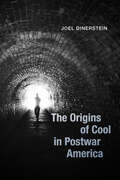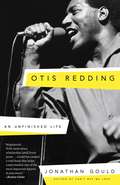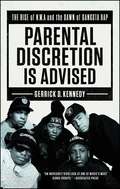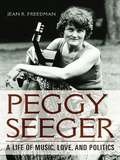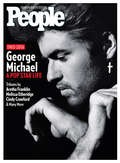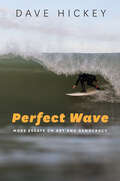- Table View
- List View
New Jazz Conceptions: History, Theory, Practice (Warwick Series in the Humanities)
by Roger Fagge Nicolas PillaiNew Jazz Conceptions: History, Theory, Practice is an edited collection that captures the cutting edge of British jazz studies in the early twenty-first century, highlighting the developing methodologies and growing interdisciplinary nature of the field. In particular, the collection breaks down barriers previously maintained between jazz historians, theorists and practitioners with an emphasis on interrogating binaries of national/local and professional/amateur. Each of these essays questions popular narratives of jazz, casting fresh light on the cultural processes and economic circumstances which create the music. Subjects covered include Duke Ellington’s relationship with the BBC, the impact of social media on jazz, a new view of the ban on visiting jazz musicians in interwar Britain, a study of Dave Brubeck as a transitional figure in the pages of Melody Maker and BBC2’s Jazz 625, the issue of ‘liveness’ in Columbia’s Ellington at Newport album, a musician and promoter's views of the relationship with audiences, a reflection on Philip Larkin, Kingsley Amis and Eric Hobsbawm as jazz critics, a musician’s perspective on the oral and generational tradition of jazz in a British context, and a meditation on Alan Lomax’s Mr. Jelly Roll, and what it tells us about cultural memory and historical narratives of jazz.
New Orleans Remix (American Made Music Series)
by Jack SullivanSince the 1990s, New Orleans has been experiencing its greatest musical renaissance since Louis Armstrong. Brass band, funk, hip hop, Mardi Gras Indian, zydeco, and other styles are rocking the city in new neighborhood bars far from the Bourbon Street tourist scene. Even "neotraditional" jazz players have emerged in startling numbers, making the old sound new for a younger generation.In this book, Jack Sullivan shines the light on superb artists little known to the general public--Leroy Jones, Shamarr Allen, Kermit Ruffins, Topsy Chapman, Aurora Nealand, the Brass-A-Holics. He introduces as well a surge of female, Asian, and other previously marginalized groups that are making the vibe more inclusive than ever. New Orleans Remix covers artists who have broken into the national spotlight--the Rebirth Brass Band, Trombone Shorty, Jon Batiste--and many creators who are still little known. Based on dozens of interviews and archival documents, this book delivers their perspectives on how they view their present in relation to a vital past.The city of New Orleans has always held fiercely to the old even as it invented the new, a secret of its dynamic success. Marching tunes mingled with jazz, traditional jazz with bebop, Mardi Gras Indian percussion with funk, all producing wonderfully bewildering yet viable fusions. This book identifies the unique catalytic power of the city itself. Why did New Orleans spawn America's greatest vernacular music, and why does its musical fire still burn so fiercely, long after the great jazz eruptions in Chicago, Kansas City, and others declined? How does a tradition remain intensely creative for generations? How has the huge influx of immigrants to New Orleans, especially since Hurricane Katrina, contributed to the city's current musical harmony? This book seeks answers through the ideas of working musicians who represent very different sensibilities in voices often as eloquent as their music.
New Perspectives in Music History and Criticism: Music and Fantasy in the Age of Berlioz (New Perspectives in Music History and Criticism #27)
by Francesca BrittanThe centrality of fantasy to French literary culture has long been accepted by critics, but the sonorous dimensions of the mode and its wider implications for musical production have gone largely unexplored. In this book, Francesca Brittan invites us to listen to fantasy, attending both to literary descriptions of sound in otherworldly narratives, and to the wave of 'fantastique' musical works published in France through the middle decades of the nineteenth century, including Berlioz's 1830 Symphonie fantastique, and pieces by Liszt, Adam, Meyerbeer, and others. Following the musico-literary aesthetics of E. T. A. Hoffmann, they allowed waking and dreaming, reality and unreality to converge, yoking fairy sound to insect song, demonic noise to colonial 'babbling', and divine music to the strains of water and wind. Fantastic soundworlds disrupted France's native tradition of marvellous illusion, replacing it with a magical materialism inextricable from republican activism, theological heterodoxy, and the advent of 'radical' romanticism.
New Perspectives in Music History and Criticism: Music, Literature, Liberalism (New Perspectives in Music History and Criticism)
by Phyllis WeliverThe daughter of one of Britain's longest-serving Prime Ministers, Mary Gladstone was a notable musician, hostess of one of the most influential political salons in late-Victorian London, and probably the first female prime ministerial private secretary in Britain. Pivoting around Mary's initiatives, this intellectual history draws on a trove of unpublished archival material that reveals for the first time the role of music in Victorian liberalism, explores its intersections with literature, recovers what the high Victorian salon was within a wider cultural history, and shows Mary's influence on her father's work. Paying close attention to literary and biographical details, the book also sheds new light on Tennyson's poetry, George Eliot's fiction, the founding of the Royal College of Music, the Gladstone family, and a broad plane of wider British culture, including political liberalism and women, sociability, social theology, and aesthetic democracy.
A Newfoundlander in Canada: Always Going Somewhere, Always Coming Home
by Alan DoyleFollowing the fantastic success of his bestselling memoir, Where I Belong, Great Big Sea front man Alan Doyle returns with a hilarious, heartwarming account of leaving Newfoundland and discovering Canada for the first time.Armed with the same personable, candid style found in his first book, Alan Doyle turns his perspective outward from Petty Harbour toward mainland Canada, reflecting on what it was like to venture away from the comforts of home and the familiarity of the island. Often in a van, sometimes in a bus, occasionally in a car with broken wipers "using Bob's belt and a rope found by Paddy's Pond" to pull them back and forth, Alan and his bandmates charted new territory, and he constantly measured what he saw of the vast country against what his forefathers once called the Daemon Canada. In a period punctuated by triumphant leaps forward for the band, deflating steps backward and everything in between—opening for Barney the Dinosaur at an outdoor music festival, being propositioned at a gas station mail-order bride service in Alberta, drinking moonshine with an elderly church-goer on a Sunday morning in PEI—Alan's few established notions about Canada were often debunked and his own identity as a Newfoundlander was constantly challenged. Touring the country, he also discovered how others view Newfoundlanders and how skewed these images can sometimes be. Asked to play in front of the Queen at a massive Canada Day festival on Parliament Hill, the concert organizers assured Alan and his bandmates that the best way to showcase Newfoundland culture was for them to be towed onto stage in a dory and introduced not as Newfoundlanders but as "Newfies." The boys were not amused. Heartfelt, funny and always insightful, these stories tap into the complexities of community and Canadianness, forming the portrait of a young man from a tiny fishing village trying to define and hold on to his sense of home while navigating a vast and diverse and wonder-filled country.
A NIME Reader: Fifteen Years of New Interfaces for Musical Expression (Current Research in Systematic Musicology #3)
by Michael J. Lyons Alexander Refsum JenseniusWhat is a musical instrument? What are the musical instruments of the future? This anthology presents thirty papers selected from the fifteen year long history of the International Conference on New Interfaces for Musical Expression (NIME). NIME is a leading music technology conference, and an important venue for researchers and artists to present and discuss their explorations of musical instruments and technologies. Each of the papers is followed by commentaries written by the original authors and by leading experts. The volume covers important developments in the field, including the earliest reports of instruments like the reacTable, Overtone Violin, Pebblebox, and Plank. There are also numerous papers presenting new development platforms and technologies, as well as critical reflections, theoretical analyses and artistic experiences. The anthology is intended for newcomers who want to get an overview of recent advances in music technology. The historical traces, meta-discussions and reflections will also be of interest for longtime NIME participants. The book thus serves both as a survey of influential past work and as a starting point for new and exciting future developments.
Nina: Jazz Legend and Civil-Rights Activist Nina Simone
by Alice Brière-HaquetWith evocative black-and-white illustrations and moving prose, readers are introduced to jazz-music legend and civil-rights activist Nina Simone. A stunning picture-book biography of the High Priestess of Soul and one of the greatest voices of the 20th century. Shared as a lullaby to her daughter, a soulful song recounts Simone's career, the trials she faced as an African American woman, and the stand she took during the Civil Rights Movement. This poignant picture book offers a melodic tale that is both a historic account of an iconic figure and an extraordinary look at how far we've come and how far we still need to go for social justice and equality. A timeless and timely message aptly appropriate for today's social and political climates.♦ "A good introduction to Simone&’s life, from her early love of music to her rise to the status of legend" —Kirkus Reviews, starred review♦ "Strikingly illustrated" —Booklist, starred review♦ "Hauntingly beautiful illustrations" —Foreword Reviews, starred review"Stirring and powerful. . . " —BookPage
No Remedy for Love
by Liona BoydA new memoir from internationally renowned musician Liona Boyd. Few people’s lives are as romantic and adventurous as Liona Boyd’s has been. She has performed around the world, sold millions of albums, won five Juno awards, serenaded numerous heads of state, and, for eight years, dated Prime Minister Pierre Trudeau. Continuing her story in a new memoir, Liona recounts how she lost her ability to perform, details her divorce, and chronicles the emotional roller-coaster ride that followed. After six years of searching for answers, reinventing her technique, and learning to sing, she returned to Canada and a new career, creating five new albums as a singer, songwriter, and guitarist. Liona shares the joys of composing and recording her own music and her cast of international friends, who include singer and actress Olivia Newton-John and her friend and pen pal of over thirty years, HRH Prince Philip. Liona reveals her love affairs, spiritual journeys, personal and musical struggles, and greatest triumphs. Writing with candour and passion, she gives a behind-the-scenes tour of her fascinating world.
The Nobel Lecture
by Bob DylanOn October 13, 2016, it was announced that Bob Dylan had been awarded the Nobel Prize for Literature, recognizing his countless contributions to music and letters over the last fifty years. Some months later, he delivered a lecture that will now be available in book form for generations to come. In it, he reflects on his life and experience with literature, giving readers a rare and intimate look at an American icon. From being inspired by Buddy Holly to the novels that helped shape his own approach to writing (The Odyssey, Moby Dick, and All Quiet on the Western Front), this is Dylan like you've never seen him before.
The Nobel Lecture
by Bob DylanPublished for the first time in a beautiful collectible edition, the essential lecture delivered by the 2016 recipient of the Nobel Prize in Literature, Bob Dylan.On October 13, 2016, Bob Dylan was awarded the Nobel Prize in Literature, recognizing his countless contributions to music and letters over the last fifty years. Some months later, he delivered an acceptance lecture that is now memorialized in book form for generations to come. In The Nobel Lecture, Dylan reflects on his life and experience with literature, providing both a rare artistic statement and an intimate look at a uniquely American icon. From finding inspiration in the music of Buddy Holly and Leadbelly to the works of literature that helped shape his own approach to writing—The Odyssey, Moby-Dick, and All Quiet on the Western Front—this is Dylan like you’ve never seen him before.
Norwich's Military Legacy (Military Legacy)
by Michael ChandlerOriginally a town that was built of wood by the Anglo-Saxons, it was later burned down and then rebuilt as Englands second city, after London, by William the Conqueror. Riots between the church and the citizens saw Norwich at war with the Pope in 1272 when a gate was constructed as a penance. The Norfolk Regiment has seen its men in combat from the Napoleonic Wars, the Crimean War, the Boer War and both World Wars. The more recent conflicts in the Falklands, Iraq and Afghanistan have also witnessed the bravery of the Norfolks. A comprehensive list of military personnel who gave their lives is examined, including Norwich-born Second Lieutenant Wilfred Edwards VC, as well as an account of 9694 Private John Henry Abigail of the Norfolk Regiment who, on 12 September 1917, aged 21, was executed for being AWOL. It would not be until November 2006 that Private Abigail was pardoned by the British government.
O Sing unto the Lord: A History of English Church Music
by Andrew GantFor as long as people have worshipped together, music has played a key role in church life. With O Sing unto the Lord, Andrew Gant offers a fascinating history of English church music, from the Latin chant of late antiquity to the great proliferation of styles seen in contemporary repertoires. The ornate complexity of pre-Reformation Catholic liturgies revealed the exclusive nature of this form of worship. By contrast, simple English psalms, set to well-known folk songs, summed up the aims of the Reformation with its music for everyone. The Enlightenment brought hymns, the Methodists and Victorians a new delight in the beauty and emotion of worship. Today, church music mirrors our multifaceted worldview, embracing the sounds of pop and jazz along with the more traditional music of choir and organ. And reflecting its truly global reach, the influence of English church music can be found in everything from masses sung in Korean to American Sacred Harp singing. From medieval chorales to “Amazing Grace,” West Gallery music to Christmas carols, English church music has broken through the boundaries of time, place, and denomination to remain familiar and cherished everywhere. Expansive and sure to appeal to all music lovers, O Sing unto the Lord is the biography of a tradition, a book about people, and a celebration of one of the most important sides to our cultural heritage.
Of Grunge and Government: Let's Fix This Broken Democracy!
by Krist NovoselicThe Nirvana bassist “offers specific platforms for electoral reform . . . as well as charming anecdotes about rock ‘n’ roll as a pursuit of happiness” (Sarah Vowell, The New York Times Book Review). A memoir of both music and politics, Of Grunge and Government tells Krist Novoselic’s story of how during his years with Kurt Cobain and Nirvana, the band made a point of playing benefits—the Rock for Choice show, a concert for gay rights, a fundraising gig for the Balkan Women’s Aid Fund—and how in the ensuing years he has dedicated himself to being a good citizen and participating in American democracy. In this book he shares stories about making music and making a statement—as well as inspiring ideas for anyone who wants to advance progressive causes, to become a more active part of the community, and to make sure our votes count and our voices are heard.
The Ohio Valley Jazz Festival (Images of Modern America)
by Scott M. SantangeloCincinnati, Ohio, might have seemed like an unlikely choice to host the nation's largest annual R&B concert, but thanks to local promoter Dino Santangelo, the Ohio Valley Jazz Festival would become the "Granddaddy of Them All." The first festival was held in 1962 at the Carthage Fairgrounds, but the event would continue to grow--moving to Crosley Field in 1964 and then Riverfront Stadium in 1971--to become the nation's biggest two-day stadium concert. The Ohio Valley Jazz Festival would eventually feature the most popular R&B artists of the day and draw audiences from as far as 500 miles away. The festival pioneered stadium concert production, generated millions for the regional economy, and eased the Greater Cincinnati community's difficult cultural transition throughout the turbulent 1960s and 1970s.
On Becoming a Rock Musician (Legacy Editions)
by H. Stith BennettIn the 1960s and 1970s, becoming a rock musician was fundamentally different than playing other kinds of music. It was a learned rather than a taught skill. In On Becoming a Rock Musician, sociologist H. Stith Bennett observes what makes someone a rock musician and what persuades others to take him seriously in this role. The book explores how bands form; the backstage and onstage reality of playing in a band; how bands promote themselves and interact with audiences and music professionals like DJs; and the role of performance.
On Power: My Journey Through the Corridors of Power and How You Can Get More Power
by Gene SimmonsYOU DESERVE TO HAVE POWER.IT IS YOURS FOR THE TAKING.GENE SIMMONS IS HERE TO UNLOCK THE DOORS TO THE TEMPLE.Gene Simmons, KISS front-man, multi-hyphenate entrepreneur, and master of self-invention, shares his philosophy on power—how to attain it, how to keep it, and how to harness it as a driving force in business and in life.As co-founder of KISS, America's #1 gold record-award-winning group of all time, Simmons knows the thrill and seduction of power firsthand. But gold records alone don’t equal power. The decisions you make once you attain a certain level of success are what separate the pretenders from the pantheon.Inspired by Niccolo Machiavelli’s The Prince, Simmons offers his unique take on the dynamics of power in every realm of life, from the bedroom to the boardroom, to the world of rock, celebrity, and social media, to politics. With one-of-a-kind anecdotes from his life and career, as well as stories from historical and contemporary masters of power, including Winston Churchill, Napoleon Bonaparte, Warren Buffett, Michael Jordon, Oprah, and Elon Musk, Simmons crafts a persuasive and provocative theory on how the pursuit of power drives civilization and defines our lives.The rules of power are changing in today’s fast-paced, hyper-connected world in a way that Machiavelli never could have imagined, and we all need to learn to adapt. Simmons tells readers: Ignore the negatives. Be unrelenting. Rise above the rest. You are the architect of your success.
Once Upon a Time in Shaolin: The Untold Story of Wu-Tang Clan's Million-Dollar Secret Album, the Devaluation of Music, and America's New Public Enemy No. 1
by Cyrus BozorgmehrThe untold story of the world's most controversial album---a surreal tale of secret recordings, the Wu-Tang Clan, baffled customs agents, the world's most hallowed art institutions, and a villain of comic book proportions: Martin Shkreli.In 2007, the innovative young Wu-Tang producer, Cilvaringz, took an incendiary idea to his mentor the RZA. They felt that the impact of digitization threatened the sustainability of the record industry and independent artists, while shifting the perception of music from treasured works of art to disposable consumer products. Together they conceived a statement so radical that it would unleash a torrent of global debate---a sole copy of an album in physical form, encased in gleaming silver and sold through an auction house for millions as a work of contemporary art.The execution of this plan raised a number of complex questions: Would selling an album for millions be the ultimate betrayal of music? How would fans react to an album that's sold on the condition that it could not be commercialized? And could anyone ever justify the selling of the album to the infamous Martin Shkreli?As headlines flashed across the globe, the mystery only deepened. Opinions were sharply divided over whether this was high art or hucksterism---quixotic idealism or a cynical cash grab. Was it a noble act of protest, an act of cultural vandalism, an obscene symbol of greed, a subversive masterpiece, a profound mirror for our time, or a joker on capitalism's card table? As senior adviser to the project, Cyrus Bozorgmehr is uniquely placed to unlock the secrets behind the album and tell the full, unadulterated story. With explosive revelations about backroom plans made public for the first time, Once Upon a Time in Shaolin charts the album's journey from inception to disruption in vivid style.An extraordinary adventure that veers between outlandish caper and urgent cultural analysis. Once Upon a Time in Shaolin twists and turns through the mayhem and the mischief, while asking profound questions about our relationship with art, music, technology, and ultimately ourselves.
Opera and the Political Imaginary in Old Regime France
by Olivia BloechlFrom its origins in the 1670s through the French Revolution, serious opera in France was associated with the power of the absolute monarchy, and its ties to the crown remain at the heart of our understanding of this opera tradition (especially its foremost genre, the tragédie en musique). In Opera and the Political Imaginary in Old Regime France, however, Olivia Bloechl reveals another layer of French opera’s political theater. The make-believe worlds on stage, she shows, involved not just fantasies of sovereign rule but also aspects of government. Plot conflicts over public conduct, morality, security, and law thus appear side-by-side with tableaus hailing glorious majesty. What’s more, opera’s creators dispersed sovereign-like dignity and powers well beyond the genre’s larger-than-life rulers and gods, to its lovers, magicians, and artists. This speaks to the genre’s distinctive combination of a theological political vocabulary with a concern for mundane human capacities, which is explored here for the first time. By looking at the political relations among opera characters and choruses in recurring scenes of mourning, confession, punishment, and pardoning, we can glimpse a collective political experience underlying, and sometimes working against, ancienrégime absolutism. Through this lens, French opera of the period emerges as a deeply conservative, yet also more politically nuanced, genre than previously thought.
The Original Blues: The Emergence of the Blues in African American Vaudeville (American Made Music Series)
by Lynn Abbott Doug SeroffBlues Book of the Year —Living BluesAssociation of Recorded Sound Collections Awards for Excellence Best Historical Research in Recorded Blues, Gospel, Soul, or R&B–Certificate of Merit (2018)2023 Blues Hall of Fame Inductee - Classic of Blues Literature categoryWith this volume, Lynn Abbott and Doug Seroff complete their groundbreaking trilogy on the development of African American popular music. Fortified by decades of research, the authors bring to life the performers, entrepreneurs, critics, venues, and institutions that were most crucial to the emergence of the blues in black southern vaudeville theaters; the shadowy prehistory and early development of the blues is illuminated, detailed, and given substance.At the end of the nineteenth century, vaudeville began to replace minstrelsy as America’s favorite form of stage entertainment. Segregation necessitated the creation of discrete African American vaudeville theaters. When these venues first gained popularity, ragtime coon songs were the standard fare. Insular black southern theaters provided a safe haven, where coon songs underwent rehabilitation and blues songs suitable for the professional stage were formulated. The process was energized by dynamic interaction between the performers and their racially-exclusive audience.The first blues star of black vaudeville was Butler “String Beans” May, a blackface comedian from Montgomery, Alabama. Before his bizarre, senseless death in 1917, String Beans was recognized as the “blues master piano player of the world.” His musical legacy, elusive and previously unacknowledged, is preserved in the repertoire of country blues singer-guitarists and pianists of the race recording era.While male blues singers remained tethered to the role of blackface comedian, female “coon shouters” acquired a more dignified aura in the emergent persona of the “blues queen.” Ma Rainey, Bessie Smith, and most of their contemporaries came through this portal; while others, such as forgotten blues heroine Ora Criswell and her protégé Trixie Smith, ingeniously reconfigured the blackface mask for their own subversive purposes.In 1921 black vaudeville activity was effectively nationalized by the Theater Owners Booking Association (T.O.B.A.). In collaboration with the emergent race record industry, T.O.B.A. theaters featured touring companies headed by blues queens with records to sell. By this time the blues had moved beyond the confines of entertainment for an exclusively black audience. Small-time black vaudeville became something it had never been before—a gateway to big-time white vaudeville circuits, burlesque wheels, and fancy metropolitan cabarets. While the 1920s was the most glamorous and remunerative period of vaudeville blues, the prior decade was arguably even more creative, having witnessed the emergence, popularization, and early development of the original blues on the African American vaudeville stage.
The Origins of Cool in Postwar America
by Joel DinersteinAn “entertaining” study of the enduring concept of coolness, and the mix of cultures and historical events that shaped it (The New York Times).Cool. It was a new word and a new way to be, and in a single generation, it became the supreme compliment of American culture. The Origins of Cool in Postwar America uncovers the hidden history of this concept and its new set of codes that came to define a global attitude and style. As Joel Dinerstein reveals, cool began as a stylish defiance of racism, a challenge to suppressed sexuality, a philosophy of individual rebellion, and a youthful search for social change.Through portraits of iconic figures, he illuminates the cultural connections and artistic innovations among Lester Young, Humphrey Bogart, Robert Mitchum, Billie Holiday, Frank Sinatra, Jack Kerouac, Albert Camus, Marlon Brando, James Dean, and others. We eavesdrop on conversations among Jean-Paul Sartre, Simone de Beauvoir, and Miles Davis, and on a forgotten debate between Lorraine Hansberry and Norman Mailer over the “white Negro” and black cool. We come to understand how the cool worlds of Beat writers and Method actors emerged from the intersections of film noir, jazz, and existentialism. Out of this mix, Dinerstein sketches nuanced definitions of cool that unite concepts from African-American and Euro-American culture: the stylish stoicism of the ethical rebel loner; the relaxed intensity of the improvising jazz musician; the effortless physical grace of the Method actor. To be cool is not to be hip and to be hot is definitely not to be cool.“Eminently readable. Much more than just a history of cool, this book is a studied examination of the very real, often problematic social issues that popular culture responds to.” —Publishers Weekly (starred review)“The kind of book that makes learning enjoyable.” —The Wall Street Journal“Superb.” —Times Higher Education
Otis Redding: An Unfinished Life
by Jonathan GouldThe long-awaited, definitive biography of The King of Soul, timed to coincide with the 50th anniversary of Redding's iconic performance at the 1967 Monterey Pop Festival. Otis Redding remains an immortal presence in the canon of American music on the strength of such classic hits as “(Sittin’ on) The Dock of the Bay,” “I’ve Been Loving You Too Long,” “Try a Little Tenderness,” and “Respect,” a song he wrote and recorded before Aretha Franklin made it her own. As the architect of the distinctly southern, gospel-inflected style of rhythm & blues associated with Stax Records in Memphis, Redding made music that has long served as the gold standard of 1960s soul. Yet an aura of myth and mystery has always surrounded his life, which was tragically cut short at the height of his career by a plane crash in December 1967. In Otis Redding: An Unfinished Life, Jonathan Gould finally does justice to Redding’s incomparable musical artistry, drawing on exhaustive research, the cooperation of the Redding family, and previously unavailable sources of information to present the first comprehensive portrait of the singer’s background, his upbringing, and his professional career. In chronicling the story of Redding’s life and music, Gould also presents a social history of the time and place from which they emerged. His book never lets us forget that the boundaries between black and white in popular music were becoming porous during the years when racial tensions were reaching a height throughout the United States. His indelible portrait of Redding and the mass acceptance of soul music in the 1960s is both a revealing look at a brilliant artist and a provocative exploration of the tangled history of race and music in America that resonates strongly with the present day.
Parental Discretion Is Advised: The Rise of N.W.A and the Dawn of Gangsta Rap
by Gerrick D. Kennedy“An entertaining account.” —Kirkus Reviews “In-depth portrait of a seminal group.” —Booklist “A nonstop, can't-put-it down ride.” —Library Journal Discover the stunning rise, fall, and legacy of N.W.A, one of America’s most revered and iconic enduring music groups, who put their stamp on pop culture, black culture, and who changed hip-hop music forever in this comprehensive and authoritative work of music journalism.Eazy-E, Dr. Dre, Ice Cube, MC Ren, and DJ Yella caused a seismic shift in hip-hop when they decided to form N.W.A in 1986. Suddenly rap became gangsta and relevant on the West Coast. With their hard-core image, bombastic sound, and lyrics that were equal parts poetic, lascivious, conscious, and downright in-your-face, N.W.A spoke the truth about life on the streets of Compton, California—then a hotbed of poverty, drugs, gangs, and unemployment. Their ’hood tales offered a sharp contrast from the cozy, comfortable images of thriving middle-class life emanating from television screens across America. For the group, making music was not about being nice or projecting a false reality. It was all about expressing themselves. Going beyond the story portrayed in the 2015 blockbuster movie Straight Outta Compton, through firsthand interviews, extensive research, and top-notch storytelling, Los Angeles Times music reporter Gerrick Kennedy transports you back in time and offers a front-row seat to N.W.A’s early days and the drama and controversy that followed the incendiary group as they rose to become multiplatinum artists. A riveting and illuminating work of music journalism, Parental Discretion Is Advised captures a special moment in rap music, when N.W.A made it altogether social, freaky, enterprising, and gangsta. They forced us all to take notice. For that alone, their story must be told.
Peggy Seeger: A Life of Music, Love, and Politics
by Jean R. FreedmanBorn into folk music's first family, Peggy Seeger has blazed her own trail artistically and personally. Jean Freedman draws on a wealth of research and conversations with Seeger to tell the life story of one of music's most charismatic performers and tireless advocates. Here is the story of Seeger's multifaceted career, from her youth to her pivotal role in the American and British folk revivals, from her instrumental virtuosity to her tireless work on behalf of environmental and feminist causes, from wry reflections on the U.K. folk scene to decades as a songwriter. Freedman also delves into Seeger's fruitful partnership with Ewan MacColl and a multitude of contributions which include creating the renowned Festivals of Fools, founding Blackthorne Records, masterminding the legendary Radio Ballads documentaries, and mentoring performers in the often-fraught atmosphere of The Critics Group. Bracingly candid and as passionate as its subject, Peggy Seeger is the first book-length biography of a life set to music.
PEOPLE George Michael: A Pop Star Life
by The Editors of PEOPLEWith glorious, rarely seen photos and new interviews with Aretha Franklin, Cindy Crawford, Melissa Etheridge and remembrances from many other famous friends, this People commemorative edition celebrates the unparalleled life and career of George Michael (1963-2016). From his early years as a teen songwriter with Wham! to his incredible solo success with hits like "Faith" and "Freedom '90." A must for fans!
Perfect Wave: More Essays on Art and Democracy
by Dave HickeyWhen Dave Hickey was twelve, he rode the surfer’s dream: the perfect wave. And, like so many things in life we long for, it didn’t quite turn out----he shot the pier and dashed himself against the rocks of Sunset Cliffs in Ocean Beach, which just about killed him. Fortunately, for Hickey and for us, he survived, and continues to battle, decades into a career as one of America’s foremost critical iconoclasts, a trusted, even cherished no-nonsense voice commenting on the all-too-often nonsensical worlds of art and culture. Perfect Wave brings together essays on a wide range of subjects from throughout Hickey’s career, displaying his usual breadth of interest and powerful insight into what makes art work, or not, and why we care. With Hickey as our guide, we travel to Disneyland and Vegas, London and Venice. We discover the genius of Karen Carpenter and Waylon Jennings, learn why Robert Mitchum matters more than Jimmy Stewart, and see how the stillness of Antonioni speaks to us today. Never slow to judge—or to surprise us in doing so—Hickey powerfully relates his wincing disappointment in the later career of his early hero Susan Sontag, and shows us the appeal to our commonality that we’ve been missing in Norman Rockwell. With each essay, the doing is as important as what’s done; the pleasure of reading Dave Hickey lies nearly as much in spending time in his company as in being surprised to find yourself agreeing with his conclusions. Bookended by previously unpublished personal essays that offer a new glimpse into Hickey’s own life—including the aforementioned slam-bang conclusion to his youthful surfing career—Perfect Wave is not a perfect book. But it’s a damn good one, and a welcome addition to the Hickey canon.
